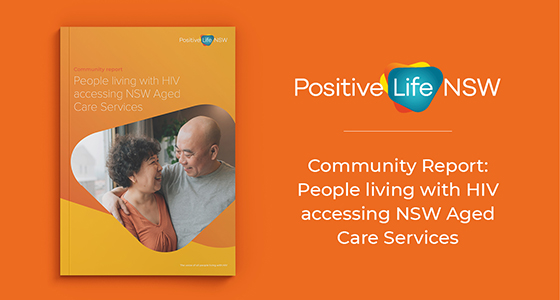
In December 2020, Positive Life NSW released our Community Report, ‘People living with HIV accessing NSW Aged Care Services’ about the NSW-specific findings from the first national Australian consultation, which canvassed the use and acceptability of aged care services by Australian people living with HIV.
As the lead agency in NSW representing the largest population of all people living with HIV in Australia, our Community Report relates findings based on NSW respondents living with HIV, and the intersection of health burdens and attitudes of people living with HIV including those of our carers, partners and family. The report also highlights the fears and concerns held by both people living with HIV and HIV specialist service respondents about HIV stigma and discrimination in aged care facilities, as well as the restrictions of the Aged Care Service Model itself by all respondents, which included people living with HIV, our carers, partners and family and HIV specialist service providers.
“There was general agreement across all participants that mainstream aged care services are not equipped to deal with people living with HIV especially people living with HIV-associated neurocognitive disorder (HAND) and HIV-associated dementia (HAD),” said Jane Costello, Positive Life CEO. “Unless aged care staff receive adequate training which involves people living with HIV themselves, institutionalised cases of stigma and discrimination are likely,” she said.
“To preclude this risk, many NSW-based people living with HIV reported a preference to receive aged care in their own home from community attached services, or other people living with HIV or LGBTIQ peers,” said Lance Feeney, Positive Life Researcher and Senior Advocacy and Policy Consultant.
The preference for aged care services from other people living with HIV and LGBTIQ peers not only extended to service provision, but also to the seeking and receiving of information about assessment, service availability, and the application processes.
Unsurprisingly, many NSW-based people living with HIV reported deeply held fears of engaging with existing mainstream aged care services. Survey respondents noted having observed or experienced specific incidents and associated stigma and discrimination by aged care service staff who held prejudicial views about HIV, homosexuality, diverse genders, and drug use. NSW-based HIV specialist service respondents also expressed considerable concern, and questioned the ability of the current mainstream aged care services to provide non-discriminatory care of people living with HIV.
“We found an overwhelming majority of our NSW-based peers preferred a person-centred service approach operated by other people living with HIV (peers) to remain living at home for as long as possible,” said Mr Feeney.
“Educating and training aged care service providers and their staff along with improved specialist medical linkage in aged care service settings, are only part of the solution,” he said.
The Community Report includes the nine evidence-based recommendations published in our national submission to the Royal Commission into Aged Care Quality and Safety (the Royal Commission), to assist the Commonwealth and the aged care service sector to ensure and enable aged care services to meaningfully engage with people living with HIV and meet the Australian Aged Care Quality Standards (ACQS) in relation to all people living with HIV.
Community Report:People living with HIV accessing NSW Aged Care Services






